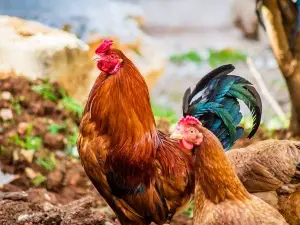
Chickens can’t talk and tell us when something is wrong, but we humans can tell when something is wrong with our birds by looking at their behavior and appearance.
A change in your bird is a sign that there is something going on with your bird. If your chicken has a swollen vent this article will help you figure out why.
Table of Contents
Swollen chicken vent:
The vent is an important chicken organ, this body part plays a role in reproduction and also plays a role in the removal of waste. It should be small, pink, and moist. If your bird’s vent is swollen then this could be why:
Vent gleet:
Vent gleet develops when a chicken’s cloaca becomes infected, the cloaca is sometimes called the vent. This infection and swelling of the cloaca is caused by Candida albicans
Vent gleet causes a variety of symptoms including a swollen and red vent, it also causes the bird to develop a whitish-yellow discharge at the vent. The production of this discharge is another major sign of vent gleet.
Symptoms:
In addition to the swollen vent, other symptoms of vent gleet include:
- Dull feathers
- Dirty feathers around the vent
- Swollen abdomen
- Lethargy
Causes:
Vent gleet can be caused by a variety of things, mouldy food can cause vent gleet, Candida-type molds can cause vent gleet.
A bird that isn’t getting enough water may develop vent gleet. Stress, which can negatively affect the ph levels of your bird’s body, causing it to become too acidic, or alkaline, can also cause your bird to develop vent gleet.
Vent gleet can also develop after a round of antibiotics if probiotics are not given to the bird
Treatment:
The first thing that you’d need to do is isolate the bird to keep other birds from getting sick. Isolating the bird will also keep other birds from pecking at the bird’s vent.
Soak the bird in a solution of epsom salts and warm water, clean the bird’s vent using this solution, do this every day.
Use an antifungal cream on the bird’s vent after soaking and cleaning the bird, Canesten cream is safe to use on chickens. Cutting the feathers at your bird’s vent is also recommended.
Giving the bird an apple cider vinegar drink until it recovers, is also recommended. Mix one tablespoon of apple cider vinegar to one gallon of water and give this to your bird as its only source of water.
Adding a probiotic, like yogurt, to your bird’s diet, is also recommended. Yogurt is filled with probiotics with live cultures and it will help to rehydrate the bird.
Prolapsed vent:
Your bird’s vent may look swollen but what you may be looking at may actually be a prolapsed vent.
A prolapsed vent develops when the bird’s cloaca becomes inverted, pushes outside of the bird’s body, and can be seen from outside. The red tissue that you see at the back is the cloaca, this is normally inside the bird.
Symptoms:
A bird that has a prolapsed vent will have one or more of these symptoms:
- Lethargy
- A lack of appetite
- Isolation
- Puffed up feathers
Causes of a prolapsed vent:
A prolapsed vent can develop because of a variety of reasons.
This condition can happen if a bird tries to lay an egg and the egg brings the cloaca out with it. Obesity can be the cause as well, obesity can cause the bird to strain during egg-laying, and this can result in a prolapsed vent.
Forcing fecal matter out, because the bird is constipated, can also cause a prolapsed vent.
What to do:
Start off by isolating the bird, this will keep other birds from pecking at the sick bird’s vent and will calm the bird.
Soak the bottom of the bird and clean the area getting rid of the debris and feces. Applying a small amount of a topical antimicrobial solution, like vetericyn which is safe for chickens, on the prolapsed vent will help to keep the area clean.
You’d then need to push the prolapsed vent back into the bird. Cover your bird’s head and upper body with a towel to keep it calm before pushing the prolapsed vent back in.
Gently insert the cloaca back into the bird by massaging it. Do this with the help of a water-based lubricant and make sure you wear latex gloves when doing this.
If you prefer, you can take your bird to be seen by an avian vet who will massage the vent back in. Contacting a vet is recommended if the vent becomes infected.
FAQ:
Why is my chicken swollen like a balloon?
A lot of conditions can cause your chicken to swell up in different areas.
Conditions that can cause swelling include ascites, which can cause swelling at the bird’s abdomen, crop impaction which can cause your bird to develop a swollen crop, the bird may puff up its feathers and look swollen, it does this to keep warm, or, if your bird’s foot is swollen then the animal may have bumblefoot.
What can I give a chicken for swelling?
What you would give your chicken for swelling would depend on the reason behind the swelling in your chicken.
Swelling can be reduced with honey but it can also be reduced by using a drawing salve. In other cases, you may need to take your chicken to a vet to reduce the swelling.
If you enjoyed this article then you may also be interested in other chicken related articles. Here are some articles that you may be interested in: Chicken Bloated And Lethargic, Dead Chick In Incubator, Lethargic Chicken With A Dirty Vent, Vent Gleet Or Egg Bound, Chicken Swollen Below Vent,

